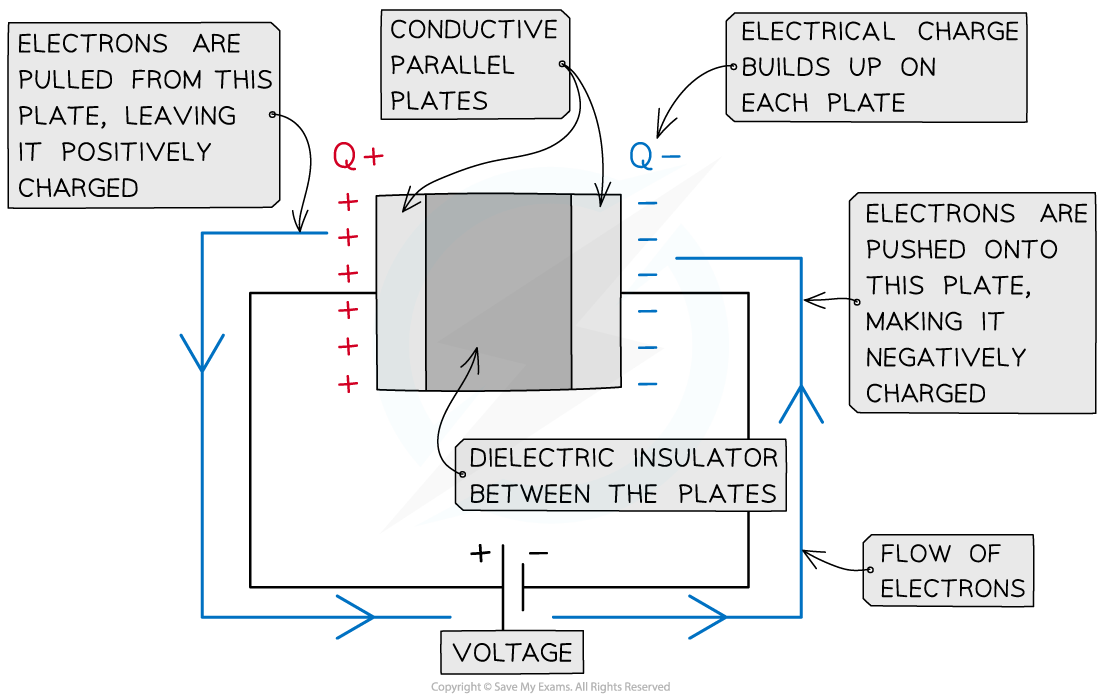- 翰林提供学术活动、国际课程、科研项目一站式留学背景提升服务!
- 400 888 0080
CIE A Level Physics复习笔记19.1.1 Capacitance
Defining Capacitance
- Capacitors are electrical devices used to store energy in electronic circuits, commonly for a backup release of energy if the power fails
- They can be in the form of:
- An isolated spherical conductor
- Parallel plates
- Capacitors are marked with a value of their capacitance. This is defined as:
The charge stored per unit potential difference
- The greater the capacitance, the greater the energy stored in the capacitor
- A parallel plate capacitor is made up of two conductive metal plates connected to a voltage supply
- The negative terminal of the voltage supply pushes electrons onto one plate, making it negatively charged
- The electrons are repelled from the opposite plate, making it positively charged
- There is commonly a dielectric in between the plates, this is to ensure charge does not freely flow between the plates

A parallel plate capacitor is made up of two conductive plates with opposite charges building up on each plate
Exam Tip
The ‘charge stored’ by a capacitor refers to the magnitude of the charge stored on each plate in a parallel plate capacitor or on the surface of a spherical conductor. The capacitor itself does not store charge.
Calculating Capacitance
- The capacitance of a capacitor is defined by the equation:

- Where:
- C = capacitance (F)
- Q = charge (C)
- V = potential difference (V)
- It is measured in the unit Farad (F)
- In practice, 1 F is a very large unit
- Capacitance will often be quoted in the order of micro Farads (μF), nanofarads (nF) or picofarads (pF)
- If the capacitor is made of parallel plates, Q is the charge on the plates and V is the potential difference across the capacitor
- The charge Q is not the charge of the capacitor itself, it is the charge stored on the plates or spherical conductor
- This capacitance equation shows that an object’s capacitance is the ratio of the charge on an object to its potential
Capacitance of a Spherical Conductor
- The capacitance of a charged sphere is defined by the charge per unit potential at the surface of the sphere
- The potential V is defined by the potential of an isolated point charge (since the charge on the surface of a spherical conductor can be considered as a point charge at its centre):

- Substituting this into the capacitance equation means the capacitance C of a sphere is given by the expression:
C = 4πε0r
Worked Example
A parallel plate capacitor has a capacitance of 1 nF and connected to a voltage supply of 0.3 kV. Calculate the charge on the plates.
Step 1: Write down the known quantities
Capacitance, C = 1 nF = 1 × 10-9 F
Potential difference, V = 0.3 kV = 0.3 × 103 V
Step 2: Write out the equation for capacitance

Step 3: Rearrange for charge Q
Q = CV
Step 4: Substitute in values
Q = (1 × 10-9) × (0.3 × 103) = 3 × 10-7 C = 300 nC
Exam Tip
The letter ‘C’ is used both as the symbol for capacitance as well as the unit of charge (coulombs). Take care not to confuse the two!
转载自savemyexams

最新发布
© 2025. All Rights Reserved. 沪ICP备2023009024号-1









